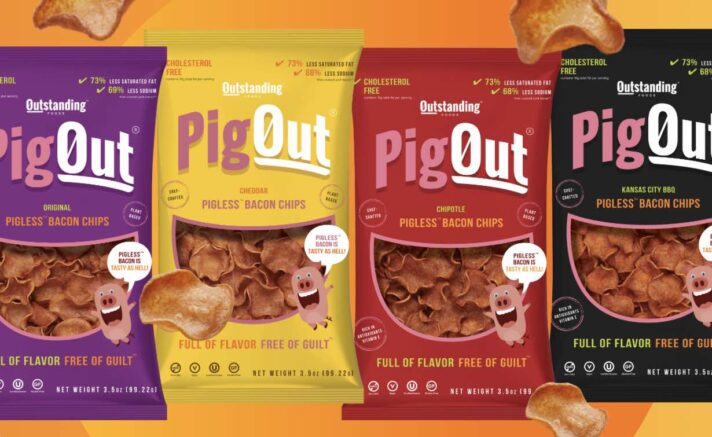“By 2005 or so, it will become clear that the Internet’s impact on the economy has been no greater than the fax machine’s.” – Paul Krugman, 1998
Ironically, the Internet is now full of these kinds of quotes, which highlight the unbelievable shortsighted tendencies that many of us have. Why do we make assumptions about the future that often end up being terribly wrong?
“This ‘telephone’ has too many shortcomings to be seriously considered as a means of communication. The device is inherently of no value to us.” – Western Union internal memo, 1876
As tempting as it is to poke fun at these unfortunate quotes, the truth is that we are all guilty of not being able to see how our future will develop. Each one of us has a certain skillset and knowledge base that we use to predict what will come next in our lives.
When we’re forced to imagine future scenarios in which we have absolutely zero experience with, we’re quick to assume something just can’t be done.
“How, sir, would you make a ship sail against the wind and currents by lighting a bonfire under her deck? I pray you, excuse me, I have not the time to listen to such nonsense.” -Napoleon Bonaparte, when told of Robert Fulton’s steamboat, 1800s
This tendency of being doubtful, or even defiant, of coming changes to our lives is especially true in today’s world. We’re advancing in the areas of medicine, technology, and numerous other fields faster than anyone of us can comprehend.
There is simply too much information out there for any of us to be an expert in multiple fields. So, when we are asked to imagine what the future looks like about something we know nothing about, we often make the most ridiculous predictions.
Additionally, many of us are specifically programmed to have certain biases against major changes. Whether that’s our political beliefs, the food we eat, or our daily routines. Humans are creatures of habit and we often fight change regardless of rationale.
Cannabis (and other ‘drugs’ such as psychedelics)
On June 18, 1971, President Nixon declared drug abuse as “public enemy number one” and quickly launched one of the most expensive and ineffective campaigns ever undertaken by a government. Today, almost fifty years later, the United States spends over $50 billion per year on initiatives to combat illegal drug trade.
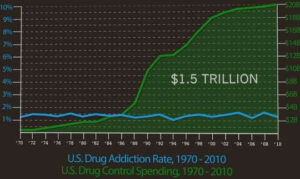
Source: Reason
What has been lost in this entire campaign is what is actually being fought. Are we fighting actual drugs? Are we fighting the users of drugs? Are we fighting the producers of drugs? Are we fighting the transporters and sellers of drugs? The answer is that we are fighting all of those things and losing horribly.
There is no doubt that there are harmful substances humans can consume, which can have negative effects on our broader society. Actual human health concerns, lack of labor participation, and general drags on society can all be effects caused by widespread drug use.
However, the other side of the story, which has been completely ignored, is that humans will consume whatever makes them feel better – both physically and emotionally. Those who are searching for real cures to their personal ailments won’t let the law get in their way of making themselves feel better.
The truth is that there are many outlawed ‘drugs’ which have been proven extremely effective in treating (and even curing) a wide variety of human health concerns. Cannabis and psychedelics are two such ‘drugs’ that are currently under review by a number of government agencies (such as the FDA), which will pave the way to a real regulated market.
On the cannabis front, the cat is already out of the bag. Countries around the world and dozens of US states have already decriminalized the possession and use of cannabis. Many locations now allow for recreational consumption – just like the alcohol market. And public opinion is increasingly supportive of legalization of cannabis.
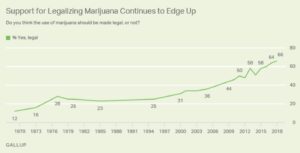
Source: Gallup
Psychedelics are now riding the coattails of cannabis, with several US cities passing decriminalization laws. At the same time, the FDA granted “Breakthrough Therapy” designation to COMPASS Pathways’ psilocybin-assisted therapy for treatment-resistant depression.
Still, there is a very strong negative stigma that is attached to all drugs, regardless of any positive effects that some have. This is one of those programmed opinions our society has been given.
Meanwhile, most of us consume lab engineered pharmaceutical products with dozens of ingredients that you can’t even pronounce, but find major issues with consuming a plant that is literally grown from the earth and has never been shown to have caused death.
Animal-less Foods
It’s no secret that companies like Beyond Meat and Impossible Foods have had tremendous success over the past couple of years. Not only are these companies providing healthier alternatives to a traditional beef hamburger patty, but they are also manufacturing their faux meats in a much more sustainable fashion.
But it’s not just beef that is getting replaced. Everything from milk and eggs, to fashion, to cosmetics are all taking steps away from using animals as their main source of material.

Still, most consumers have a love affair with animal based products as proven by the incredible worldwide increase in meat production. Meat production today is nearly five times higher than in the early 1960s. Of course this is because of increases in population, but it’s also because of the global average income, which has tripled over the past 50 years.
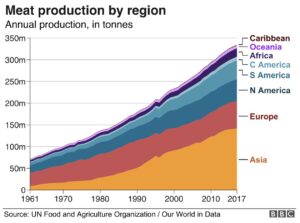
Source: BBC
While meat consumption is increasing, the types of meats being consumed are changing. In the west, consumers are shifting away from beef and turning to poultry and other meat alternatives.
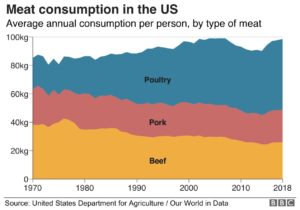
Source: BBC
Although this trend may be slow now, it’s not impossible to see how this could start to change quite rapidly in the future. To push the thinking a little further, what do you think humans will think of consuming animals one hundred years from now? Will future generations look back at us as barbarians who slaughtered billions of animals every year?
As hard as that is to imagine now, the trend is certainly headed there.
Transportation
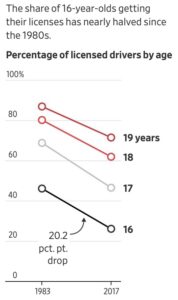
Source: WSJ
The United States has an absolute love affair with the personal automobile. This is particularly true of the baby-boomer generation that associates the car with style, adrenaline, and most importantly, freedom.
Owning a personal vehicle is not only the key to one’s independence, but it’s also a tool for prosperity. Less than a generation ago, immigrants coming to the US would often find immediate employment as a delivery or cab driver. The very idea of being able to drive a vehicle is directly correlated with being able to advance your personal prosperity.
But, that time is passing. Owning or even operating a vehicle is not only less attractive to new generations, but in many cases, it can actually be a huge burden. Freedom for younger generations is provided by a smart phone and the internet. Transportation is just a part of life that needs to be hassle and stress free, which is where Uber, Lyft, and dozens of other outsourced transportation services shine.
This is one of those trends that is extremely difficult for older generations to understand and therefore will be missed by a large number of traditional investors. Who wouldn’t want to own and drive their own car? Well, judging by the rate of decline in driver licenses, very few kids born today will even consider getting a license.
Longevity
Of all the controversial topics in our world, living longer may be one of the most misunderstood and hotly debated. There are so many different arguments that it’s hard to keep track. Everyone from scientists, to churches, to economists, to everyday people have an opinion about extending the lifespan of human beings.
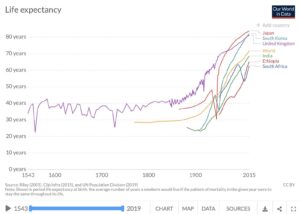
Source: OWID
Who is correct? Well, that’s the tough part… we don’t have definite answers to the majority of economic, environmental, ethical, and personal questions that are out there.
However, there are two things we know for sure:
- Humans are living longer due to healthier habits.
- Humans will be living longer due to breakthroughs in science.
As difficult as this may be to comprehend, scientists are beginning to learn how to literally reverse aging on a cellular level. That means that we are not only understanding how to extend our lifespan, but we are also starting to figure out how to make our biological clock go backwards.
From an investing standpoint, think about the potential here. How many people are going to spend money to extend their life? How many people are going to spend money to not only extend their life, but increase the physical quality of their life? (Hint: People already do this… it’s called the healthcare industry and it makes up almost 10% of the entire world’s GDP.)
–
Explorer Equity Group is already invested in each of these categories, as we believe that these unstoppable trends will only become more accepted in the near future. The time is right now to be looking hard at these industries, while there is still general disagreement amongst the majority of people. The best opportunities are often when you can identify a clear trend before the crowd.


